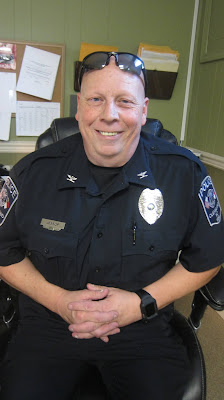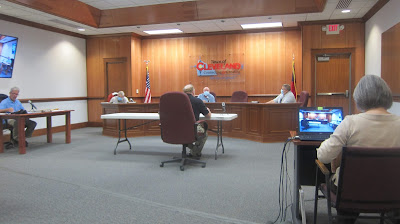Cleveland, NC special called town board meeting - Higher water/sewer and taxes
Tonight (Wednesday 5-25-2022) was the follow up special called Cleveland, NC town board meeting to complete talks about the upcoming budget.
After rather lengthy deliberations, the board agreed to a three percent increase to water and to sewer and a two percent increase to property taxes with a public hearing set for on June 13. The public hearing would allow citizens to ask questions or to present arguments for or against the proposals.
As a personal observation, I would note that the mayor and board members all seemed invested in doing what is best for the town, although opinions on how to meet objectives varied. I include this personal comment, because it is difficult to capture the "flavor" of a meeting with words which don't always reflect tone, non-verbals etc.
Water/Sewer
It is important for residents to know that water and sewer must be self sustaining. In other words, the town is legally required to charge what it costs to provide the services. Rates on spending can vary from place to place depending on decisions made by leaders, but when planning a budget, commissioners need to charge enough to cover costs on water/sewer services.
Commissioner Gerald Osborne oversees water/sewer for the town, and he said that he initially thought an increase of five percent would be required, but he researched and worked over the numbers and was able to complete a solid budget with a three percent increase to water and to sewer. A resident paying $40/month for water currently would pay $41.20 with the increase.
Commissioner Danny Gabriel noted that Cleveland residents pay lower water/sewer rates versus residents in other parts of the county. For example, Salisbury residents pays $5.48 per 1000 gallons of water compared to Clevelanders at $3.63 per 1000. Also, other towns in the county are tied to Salisbury with water rates rising with rising costs in the county seat, but Cleveland maintains control of their own water/sewer, so increases are based only on spending within Cleveland.
All board members agreed that the three percent increase was reasonable and required to meet the costs of providing the services to the town.
Taxes
The discussion on raising taxes in Cleveland was not as easily and quickly settled. Board members had different opinions on raising taxes and also on the amount to increase.
Osborne did not want to see any increase in taxes. He noted that everyone has had a rough year and that increased taxes would be a burden. He said that citizens could make changes in their use of water/sewer, but they had no control over prices when it came to taxes.
Osborne suggested that the town charge residents who do not get and use recycling cans extra. He noted that residents had control over that and that it was expensive for the town to pay for the excess trash created by some residents.
Commissioner Travis Summitt came into the meeting advocating for a five percent tax increase. He said that an increase would bump his taxes up about $49 a year which is "one meal for my family." And, he noted that there is "never a good time." [for raising taxes]
Gabriel said, "I've never heard anyone say: 'I'm glad you raised taxes.' People will complain." He said that he supported a two percent tax increase this year and mentioned that it had been six years since taxes had been increased in Cleveland.
"I see all sides," said Mayor Pat Phifer. "I try to stay in the middle."
Phifer did note that if we don't have higher taxes, "in twenty years, somebody may be in a pickle because of us."
"We don't spend above our budget," said Phifer. "Except last year." [A quarter of a million dollars went into town projects from savings last year.]
Phifer went on to say that residents might be more receptive to increased taxes when they can see all the work being done in town. So, he thought commissioners might consider an increase this year instead of putting it off until next year. [Only commissioners vote, unless a commissioner is not present, and a vote ends in a tie. Only then does the mayor vote.]
Commissioner Richard Taylor was initially opposed to a tax increase, but he considered the arguments presented by his fellow commissioners and said that he would support two percent. He noted that the low percentage would mean that taxes on those with lower property values would not be impacted with really high increases. The average Cleveland property tax is $619, so a two percent increase would be $12.38 per year.
"I don't get in much political stuff," said John Bradford. He said that he would support a two percent increase at most.
Phifer did note that Freighliner [Dahlmer] pays 2/3 of the taxes in Cleveland, and they do not really use any services other than police. He said that the taxes paid by residents currently are $1331 less per home than the cost of services due to having a large corporate neighbor.
Phifer went on to note that if a large land holding in Cleveland was opened up for housing, and six-hundred new homes were added, the cost to the town [or shortfall] would be $804,000.
After more discussions, taxes were set to increase by two percent for the upcoming year.
Closed Session
Before the budget meeting, commissioners went into closed session. The agenda had the closed session at the end of the meeting, but everyone agreed to cover the closed session first and said that "employees" would be the topic.
Commissioner Richard Taylor was not present for the closed session, but he was present for the budget discussion.
The summary following the closed session was as follows:
1. The town clerk would get a five percent pay raise. She would be the "liaison" with that being noted in the job description under consideration.
2. An employee in maintenance resigned to take another job. An advertisement will be put up for that position, and the new position (a fourth employee) would be put on hold for now.




Comments
Post a Comment